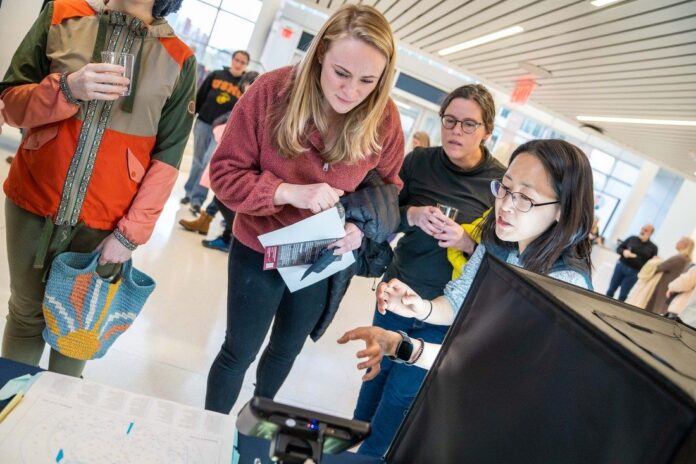When the Fralin Biomedical Research Institute was launched, neuroscience was a focus from the outset. In addition to the expertise and passion for brain research shared by founding Executive Director Michael Friedlander and the other researchers who helped start the institute, there was an equal dedication for sharing that passion with the public.
That took the form of Brain School, which has become an annual celebration of the brain and an exploration of the neuroscience research taking place at the Heath Sciences and Technology campus in Roanoke.
“Everyone is interested in knowing about their brain,” said Friedlander, who is also Virginia Tech’s vice president for health sciences and technology. “One area of research we are excited to talk about this year is how newly developed therapeutic drugs meant to help people with Type 2 diabetes affect the brain and have some unexpected spillover effects on other aspects of behavior and health.”
This year’s presentation and panel discussion “The Craving Brain: Food and Drugs” features two research leaders who are seeking a better understanding of why some Type 2 diabetes medications — semaglutides and tirzepatides, commonly known by trade names such as Ozempic and Mounjaro — have been linked to weight loss and reduced alcohol cravings.
Sharing the stage to talk about food, addiction, and the brain are Warren Bickel, the Virginia Tech Carilion Behavioral Health Research Professor at Fralin Biomedical Research Institute, and Alexandra DiFeliceantonio, assistant professor at Fralin Biomedical Research Institute who researches the effect of ultra-processed foods on the brain. They led a team of Virginia Tech researchers studying the Type 2 diabetes drugs and alcohol use; their work was published Nov. 28 in Scientific Reports.
Bickel is also director of the research institute’s Addiction Recovery Research Center and Center for Health Behaviors Research, and DiFeliceantonio is an associate director of the Center for Health Behaviors Research.
While the institute has more than 40 research teams focused on a wide range of biomedical and health sciences research — brain health, heart health, children’s health, cancer, and more — Brain School crosses many of those areas. Faculty members and graduate students from several of those teams will share their science in interactive exhibits.
In addition to Bickel and DiFeliceantonio, participating faculty include Professor Zhen Yan, director of the Center for Exercise Medicine Research, who will share research into the mechanisms of how exercise benefits brain health; Associate Professor Albert Pan, who studies the brains of zebrafish to gain insight into human brain activity; and Meike van der Heijden, one of the institute’s newest faculty research team leaders, whose research focuses on the development of cerebellar function in health and disease.
Assistant Professor Wynn Legon will talk about his research into low-intensity focused ultrasound to help manage chronic pain. Therapists from the Neuromotor Research Clinic will demonstrate their pioneering use of intensive therapy to help children with cerebral palsy and other movement disorders make rapid gains in function, and Maosen Wang will share how imaging techniques — MRI, PET and CT — support brain research.
Attendees also will learn about brain anatomy with Virginia Tech Carilion School of Medicine faculty — John McNamara, assistant professor and director of anatomy instruction, and Kristofer Rau, assistant professor of basic science education.
“We can improve human health by increased understanding of how our brains operate at multiple levels — from simple reflexive behaviors, to critical bodily functions, like eating, to complex functions such as decision-making and memory,” Friedlander said. “Understanding both healthy and functionally compromised brains is crucial to better understanding who we are and why we act and interact the way we do.”
In addition to inviting the community to the research institute for the Monday night brain school, graduate students will visit area schools to share their work and encourage the next generation of neuroscientists.
To help with planning and receive a Brain School diploma, attendees are asked to register in advance.
By Leigh Anne Kelley

